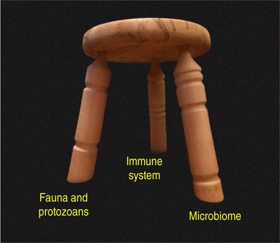Acting on this discovery could have a profound affect on human health.
 Durham, NC — The idea that loss of species diversity from the ecosystem of the human body is leading to inflammation and disease is gaining widespread acceptance. This loss of diversity, known as “biome depletion”, is caused by a variety of factors in modern society and has an effect on every aspect of our body’s development and function, including our brain’s development and function. Most attention among scientists and the media alike has focused on the microbiome, the microorganisms or germs in our biome. However, a substantial body of experimental evidence points toward the presence or absence of larger organisms, helminths or worms, as having a generally more global effect on the body’s function, including alteration in the microbiome.
Durham, NC — The idea that loss of species diversity from the ecosystem of the human body is leading to inflammation and disease is gaining widespread acceptance. This loss of diversity, known as “biome depletion”, is caused by a variety of factors in modern society and has an effect on every aspect of our body’s development and function, including our brain’s development and function. Most attention among scientists and the media alike has focused on the microbiome, the microorganisms or germs in our biome. However, a substantial body of experimental evidence points toward the presence or absence of larger organisms, helminths or worms, as having a generally more global effect on the body’s function, including alteration in the microbiome.
In a recent study funded in part by SafeMinds and published in the journal Gut Microbes , a team of investigators at Duke University asked what effect the addition of worms to a rat’s biome would have on the rat’s gut bacteria. Would the helminths affect the gut microbiome or would the microorganisms remain blissfully ignorant of the worm’s presence?
 Senior author William Parker was surprised by the magnitude of the effect of the helminths on the bacteria. According to Parker, “This study demonstrates some strong connections between different parts of the biome. We saw major differences when we compared bacteria in rats with and without worms. We found that the addition of helminths is associated with a significant (up to 20%) change from bacteria associated with an inflammatory diet to good, pro-health bacteria that are associated with less allergies. Our gut microbiome is evidently not independent of other parts of our biome. Acting on this discovery could have a profound affect on human health. The study serves as a reminder that our body is one eco-system and, just like we’ve learned from other environmental imbalances, the tendency to selectively focus on only one aspect of our ecosystem is perilous.”
Senior author William Parker was surprised by the magnitude of the effect of the helminths on the bacteria. According to Parker, “This study demonstrates some strong connections between different parts of the biome. We saw major differences when we compared bacteria in rats with and without worms. We found that the addition of helminths is associated with a significant (up to 20%) change from bacteria associated with an inflammatory diet to good, pro-health bacteria that are associated with less allergies. Our gut microbiome is evidently not independent of other parts of our biome. Acting on this discovery could have a profound affect on human health. The study serves as a reminder that our body is one eco-system and, just like we’ve learned from other environmental imbalances, the tendency to selectively focus on only one aspect of our ecosystem is perilous.”
 Laura Bono, a member of the SafeMinds Research Committee said, “This research could prove to be an exciting and very helpful development for individuals with autism who suffer from allergies, behavioral problems due to allergic reactions to foods/inhalants and immune dysfunction in general. Having easily available treatments to help their guts become less allergic and reactive to their environment would be a huge step in helping them lead healthier lives.”
Laura Bono, a member of the SafeMinds Research Committee said, “This research could prove to be an exciting and very helpful development for individuals with autism who suffer from allergies, behavioral problems due to allergic reactions to foods/inhalants and immune dysfunction in general. Having easily available treatments to help their guts become less allergic and reactive to their environment would be a huge step in helping them lead healthier lives.”
Experiments were conducted in collaboration with a diverse team of biologists at Duke, including Erin McKenney, Staci Bilbo, John Rawls, Lauren Williamson and Anne Yoder.
Learn more about the potential benefits of helminths and a regulated immune system through this SafeMinds series, Germs & Worms, Biome Diversity, and Immune System Screw Up. SafeMinds is dedicated to ending the autism epidemic by promoting environmental research and effective treatment.
HOW SAFEMINDS IS HELPING
SafeMinds funded several of the studies cited in this article and prepared several informational blogs to help parents and self-advocates utilize the science for their own treatment strategies. You can help us continue our work by donating to our Making a Difference Research Fund or our Parent and Family Education Fund, or by contacting us to volunteer.
Sources
William Parker. Microbiome Research in Autism Spectrum Disorders. Autism Research Institute Webinar Series. 5/6/2015. http://ariconference.com/?cat=29
McKenney EA, Williamson L, Yoder AD, Rawls JF, Bilbo SD, Parker W. Alteration of the rat cecal microbiome during colonization with the helminth Hymenolepis diminuta. Gut Microbes. Volume 6, Issue 3, 2015
Parker W, Ollerton J. Evolutionary biology and anthropology suggest biome reconstitution as a necessary approach toward dealing with immune disorders. Evol Med Public Health. 2013 Jan;2013(1):89-103. doi: 10.1093/emph/eot008. Epub 2013 Apr 19
Pi C, Allott EH, Ren D, Poulton S, Lee SYR, Perkins S, et al. (2015) Increased Biodiversity in the Environment Improves the Humoral Response of Rats. PLoS ONE 10(4): e0120255. doi:10.1371/journal.pone.0120255


